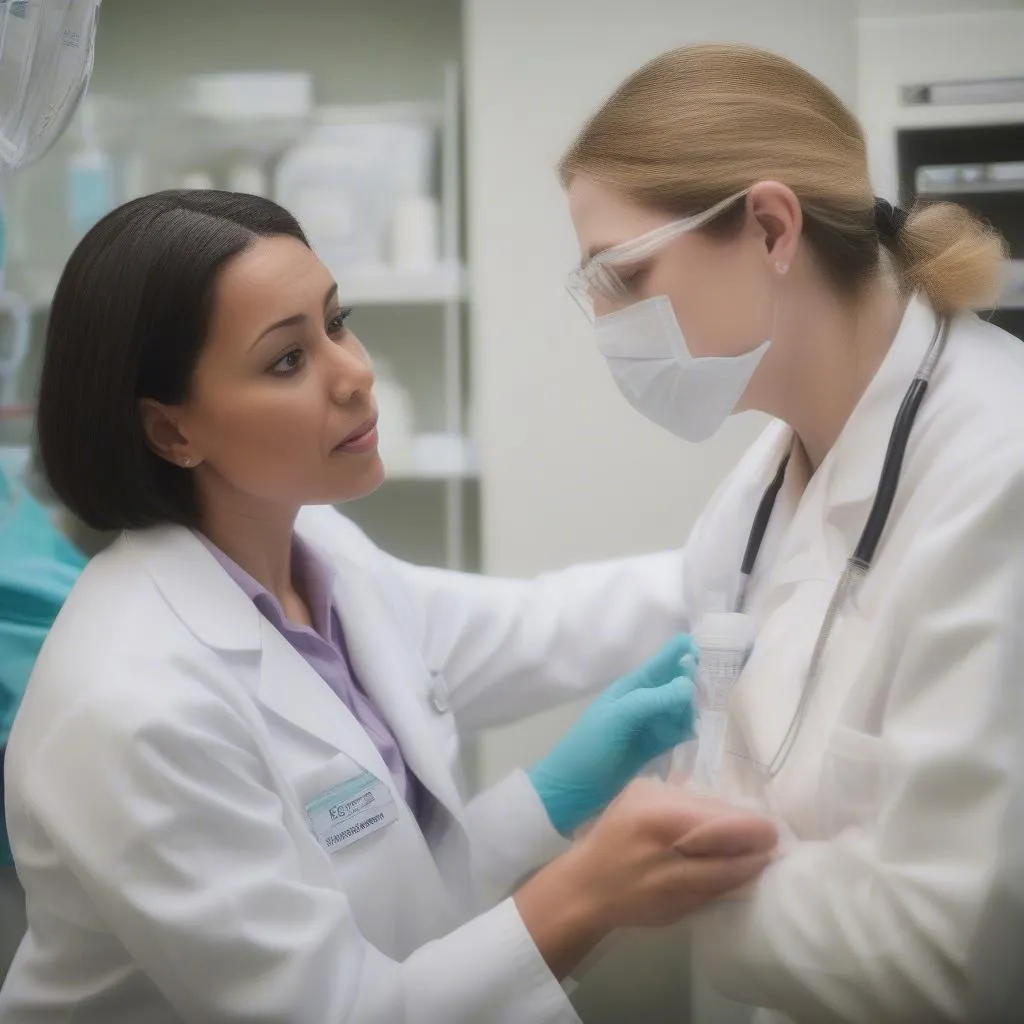Imagine this: You’re a nurse on a busy hospital ward, and you’re tasked with caring for a patient who has been diagnosed with Clostridium difficile (C. diff), a common and often serious bacterial infection. This can be a daunting task, as C. diff can cause severe diarrhea, abdominal pain, and even life-threatening complications.
But fear not! You’re not alone in this journey. This article will equip you with a comprehensive nursing care plan for C. diff patients, outlining the essential steps and considerations to ensure proper patient care.
Understanding C. Diff and its Impact
What is C. diff?
C. diff is a type of bacteria that can cause diarrhea and other intestinal problems. It’s commonly found in hospitals and other healthcare settings, where it can spread easily.
How Does C. diff Affect Patients?
C. diff infection, also known as Clostridioides difficile infection (CDI), can cause a range of symptoms from mild to severe. It can lead to:
- Diarrhea: Frequent, watery stools, sometimes accompanied by blood or mucus.
- Abdominal Pain: Cramping, tenderness, and discomfort in the abdomen.
- Fever: High body temperature.
- Dehydration: Loss of fluids and electrolytes.
- Nausea and Vomiting: Feeling sick to your stomach and throwing up.
- Fatigue: Feeling tired and weak.
Who is at Risk?
C. diff infection is most common in:
- Older Adults: People over 65 are more vulnerable to C. diff.
- People with Weakened Immune Systems: Those with underlying health conditions like diabetes, kidney disease, or cancer.
- Individuals on Antibiotics: Long-term antibiotic use can disrupt the balance of bacteria in the gut, making it easier for C. diff to multiply.
Nursing Care Plan for C. Diff: Essential Steps
1. Assessment and Monitoring
Initial Assessment:
- Medical History: Review the patient’s medical history to identify any risk factors for C. diff, such as recent antibiotic use, underlying health conditions, or previous episodes of CDI.
- Physical Examination: Assess the patient’s vital signs (temperature, pulse, blood pressure, respiration), abdominal pain, and signs of dehydration.
- Stool Examination: Collect stool samples for testing to confirm the presence of C. diff.
- Mental Status: Assess the patient’s level of consciousness, orientation, and cognitive function.
Ongoing Monitoring:
- Vital Signs: Regularly monitor the patient’s vital signs, paying close attention to temperature and pulse.
- Stool Frequency and Consistency: Record the frequency, volume, and consistency of the patient’s stool.
- Fluid Intake and Output: Monitor the patient’s fluid balance to prevent dehydration.
- Electrolyte Levels: Check for electrolyte imbalances, particularly potassium, sodium, and chloride.
- Mental Status: Monitor the patient’s level of consciousness and cognitive function.
2. Isolation and Infection Control
- Contact Precautions: Place the patient in a private room with contact precautions to prevent the spread of C. diff. This includes wearing gloves and gowns when entering the room, disinfecting surfaces regularly, and using dedicated equipment.
- Hand Hygiene: Ensure that all healthcare providers and visitors wash their hands thoroughly with soap and water or use an alcohol-based hand sanitizer.
- Environmental Cleaning: Disinfect all surfaces and equipment in the patient’s room and surrounding areas.
- Dedicated Equipment: Use dedicated equipment, such as thermometers, blood pressure cuffs, and stethoscopes, for the patient.
- Patient Education: Educate the patient and family members about the importance of hand hygiene and infection control measures.
3. Medication Administration
- Antibiotics: Administer antibiotics, such as metronidazole or vancomycin, as prescribed by the physician.
- Antidiarrheal Medications: While antidiarrheal medications are usually avoided, in some cases, they may be used to help manage diarrhea.
- Fluid and Electrolyte Replacement: Administer intravenous fluids or oral rehydration solutions to prevent dehydration.
- Probiotics: Some studies suggest that probiotics may help to prevent or treat C. diff infection.
4. Nutritional Support
- Fluid Intake: Encourage the patient to drink plenty of fluids to prevent dehydration.
- Diet: Provide a low-fiber diet to reduce the severity of diarrhea.
- Nutritional Supplements: Consider nutritional supplements to ensure the patient is receiving adequate nutrition.
- Oral Rehydration Solutions: Use oral rehydration solutions, such as Pedialyte, to replace lost fluids and electrolytes.
5. Pain Management
- Anti-Spasmodics: Administer anti-spasmodic medications to relieve abdominal cramping and pain.
- Analgesics: Use analgesics, such as acetaminophen or ibuprofen, as needed for pain relief.
- Warm Compresses: Apply warm compresses to the abdomen for comfort.
6. Psychosocial Support
- Emotional Support: Provide emotional support to the patient and family members.
- Education: Educate the patient and family about C. diff infection and the importance of adherence to treatment and infection control measures.
- Anxiety Management: Help the patient manage anxiety related to the infection and treatment.
7. Discharge Planning
- Home Care Instructions: Provide detailed instructions for home care, including hygiene practices, diet, and medication management.
- Follow-Up Appointments: Schedule follow-up appointments with the physician or nurse practitioner to monitor the patient’s progress and ensure the infection has cleared.
- Resources: Refer the patient and family to appropriate resources, such as support groups or community organizations.
Key Considerations and Frequently Asked Questions
-
How long does it take for C. diff to clear?
- Most patients recover within a few weeks with appropriate treatment.
-
Can C. diff be prevented?
- Yes! Good hand hygiene is the best way to prevent the spread of C. diff. Always wash your hands thoroughly with soap and water or use an alcohol-based hand sanitizer.
-
What are the long-term effects of C. diff?
- Most people recover fully from C. diff infection. However, some may develop chronic C. diff, which can be difficult to treat.
-
What if my patient has recurrent C. diff?
- Recurrent C. diff infections are common. Your healthcare provider may recommend a longer course of antibiotics, a different type of antibiotic, or a fecal microbiota transplant (FMT).
-
Is there a cure for C. diff?
- There is no specific cure for C. diff. However, most people recover with appropriate treatment.
Other Relevant Topics:
- Fecal Microbiota Transplant (FMT): A procedure where healthy gut bacteria from a donor are transplanted into the patient’s gut.
- Antibiotic Stewardship: This involves using antibiotics appropriately to minimize the risk of C. diff infection.
Call to Action:
Need help with diagnostics tools for European cars? Contact us via Whatsapp: +84767531508 for expert support and 24/7 assistance.
 Nursing Care Plan for C. Diff Patients
Nursing Care Plan for C. Diff Patients
 C. Diff Infection Control Measures
C. Diff Infection Control Measures
 Fecal Microbiota Transplant (FMT) for C. Diff
Fecal Microbiota Transplant (FMT) for C. Diff
This article is intended for informational purposes only and should not be considered medical advice. Always consult with a healthcare professional for diagnosis and treatment of any medical condition. Please share this information with your fellow nurses and caregivers to help raise awareness about C. diff and ensure the best possible care for patients.